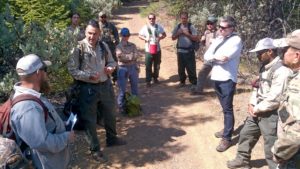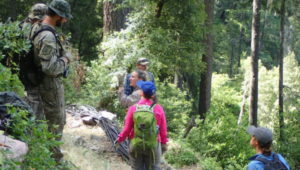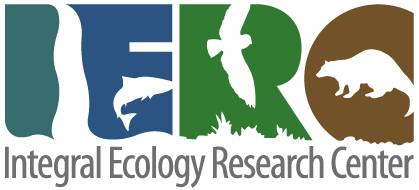Young Professional Development Internship

Here, Dr. Mourad Gabriel, Co-founder and past Director of IERC explains and informs Young Professional Development Interns, and others about the scientific goals and objectives for that day’s work.
We at Integral Ecology Research Center (IERC) understand that it is difficult for many young and aspiring natural resource professionals to enter their respective fields after graduation due to numerous factors. These could include the oversaturation of the job market with recent graduates, the lack of field, laboratory or analytical experience outside of a classroom setting, or the increase of unpaid or volunteer opportunities that could be financially burdensome. As a result, IERC initiated a new internship program which began in 2018 through a generous donation to IERC by a private family foundation. The YPD internship is a paid program through which young natural resource professionals can join the IERC team to develop new skill sets within their fields of focus.
Read More...We at IERC feel that internships are meant to be training experiences and not for productivity alone. Also, unpaid internships devalue our profession, diminish diversity, widen class divides, and potentially impede conservation efforts (Whitaker, D.M. 2003, Fournier and Bond 2015). As a result, IERC initiated the YPD internship program allowing interns to shadow IERC Technicians, Field Ecologists, Associate Ecologists, and Directors on a variety of field, office and laboratory duties to learn novel techniques for which they have limited or no prior experience outside of the classroom. These experiences include several of the following:
- Collection of water, soil and vegetation data following established protocols
- Installation, maintenance, and analysis of remote camera systems
- Collection of data on meso- and large carnivore conservation projects
- Participation in restoration projects
- Participation in wildlife telemetry exercises
- Performance of various molecular ecology skill sets such as:
- Extraction of genomic DNA from different sample types
- Running and analyzing fragments of DNA via Polymerase Chain Reactions (PCR).
- Sequencing of PCR products
- Serological evaluations for detection of antibodies in wildlife samples
- Use of resource and recreational grade GPS units for both mapping and locating project specific attributes and features
- Learning and application of Geospatial Informational System (GIS) map making and data analysis techniques with ArcMap
- Data entry into ArcGIS, Microsoft Access and Excel programs
- Contribution to written work to be included towards both scientific reports and peer-reviewed publications
We at IERC see the YPD internship program as a mechanism for upcoming young natural resource professionals to gain valuable experiences that positively support and reinforce their educational decisions without creating either financial or emotional hardships. Thus, it allows recipients of these internships to be able to focus on the new knowledge they are gaining, in turn paving a more solid foundation for their professional development.
Whitaker, D. M. 2003. The use of full-time volunteers and interns by natural resource professionals. Conservation Biology, 17:330–333.
Fournier, A. M., and Bond, A. L. 2015, Volunteer field technicians are bad for wildlife ecology. Wildlife Society Bulletin, 39: 819-821.
Gateway Science Internship

Dr. Wengert, Executive Director of IERC coordinates IERC staff, agency personnel and IERC Interns as to where grow site infrastructure should be staged for future clean-up efforts.
IERC has been offering the Science Gateway Internship focusing on a variety of research topics since its inception in 2010. Our goal with this internship is to provide novel opportunities for students and very recent graduates in the Sciences to gain valuable first employment opportunities within their chosen field of study. Nearly all employment opportunities in the biological and natural resources sciences require some degree of actual work experience outside of the classroom setting, making it extremely difficult for students or recent graduates looking for summer field jobs to ever qualify for most positions. Without that proven experience on their resumes, how will they ever be able to land that first job in our field?
Read More...The IERC Science Gateway Internship aims to offer students and recent graduates with no prior work experience in the biological or natural resource sciences a paid opportunity to prove themselves and put that initial position in their chosen fields on their resumes. IERC hopes that learning and applying new techniques in the field, rather than just learning concepts in the classroom, will allow them to identify and narrow down their own interests in science, thus preparing them for a more focused career in science or a direction towards graduate studies.
Since 2010, IERC’s Science Gateway interns have participated in our forest carnivore ecology research projects, wildlife disease monitoring projects, and cannabis cultivation site prey monitoring project.
